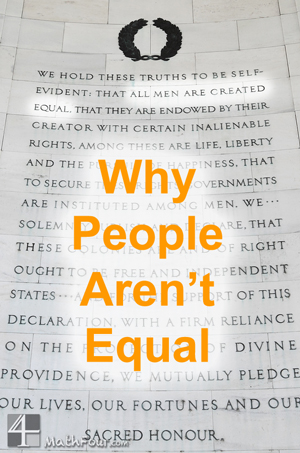This is the 3rd in a series on equality and comparison. For the rest of the series, click here.
 In order for two people to be equal, we have to put our finger on something about them to compare.
In order for two people to be equal, we have to put our finger on something about them to compare.
But political zealots (and our forefathers) don’t bother with this. They just claim “All people are equal!”
To which I respond, “How do you define equal?”
Equality is misused!
Equality is a serious math concept. It must be defined – and rigorously – before it has meaning.
You have to know what you’re comparing as well as how to determine if they are “equal.”
Let’s take fractions (yes, the F-word). We know that ![]() .
.
But why?
We define the “equal” for fractions like this:
Two fractions
and
are equal if and only if
.
Notice how specific the definition is?
For ![]() and
and ![]() , we can see that
, we can see that ![]() . Therefore we know those two are equal – by the definition!
. Therefore we know those two are equal – by the definition!
Equality has a few other requirements…
There are some other requirements to making sure equality is defined. It must also be
- Reflexive (you’d better be equal to yourself)
- Symmetric (if you’re equal to Fred, then Fred is also equal to you)
- Transitive (if you’re equal to Fred, and Fred’s equal to Hemu, then you’re equal to Hemu)
So how do you define the equality of people?
People have tons of qualities – we would go mad trying to combine them all into one thing to compare. And so far, I’ve yet to see anyone try.
Instead, just to name a few, we could compare
- Height (inches)
- IQ (with a standardized test)
- Income (dollars)
- Skin color (reflection of light)
- Location (homesteaded house numbers)
Notice these things have to be quantifiable!
But none of these guarantees that “All people are equal.”
You and I could be the same height but my income isn’t equal to yours.
Our skin might reflect the same amount of light but my house number isn’t equal to your house number.
People aren’t equal. No matter how you look at it!
But… the law should apply equally to all people.
Again, I ask, “What does that mean?”
How about if we use the words, “If one citizen in the same situation as another citizen, the law will give the same benefits and punishments to both citizens.”
Which then opens the can of worms – how do we define “same situation”?

This post may contain affiliate links. When you use them, you support us so we can continue to provide free content!






